
Have you ever considered the unexpected but crucial role that emus play in Australian agriculture?
These majestic birds offer more than meets the eye in enhancing the sustainability and productivity of farms across the country.
From their economic benefits to their unique abilities as pest controllers, emus have proven to be valuable assets to farmers in various ways.
As we delve deeper into their impact, you will discover a fascinating connection between these flightless birds and the agricultural landscape of Australia, shaping the future of farming practices.
Key Takeaways
- Emus contribute to pest control, ecosystem balance, and increased crop yields.
- Emus require low maintenance, reducing operational costs for farmers.
- Emus enhance biodiversity, support regenerative agriculture, and aid in carbon sequestration.
- Emus play a role in livestock guardianship, water conservation, and drought resilience.
Economic Benefits of Emus
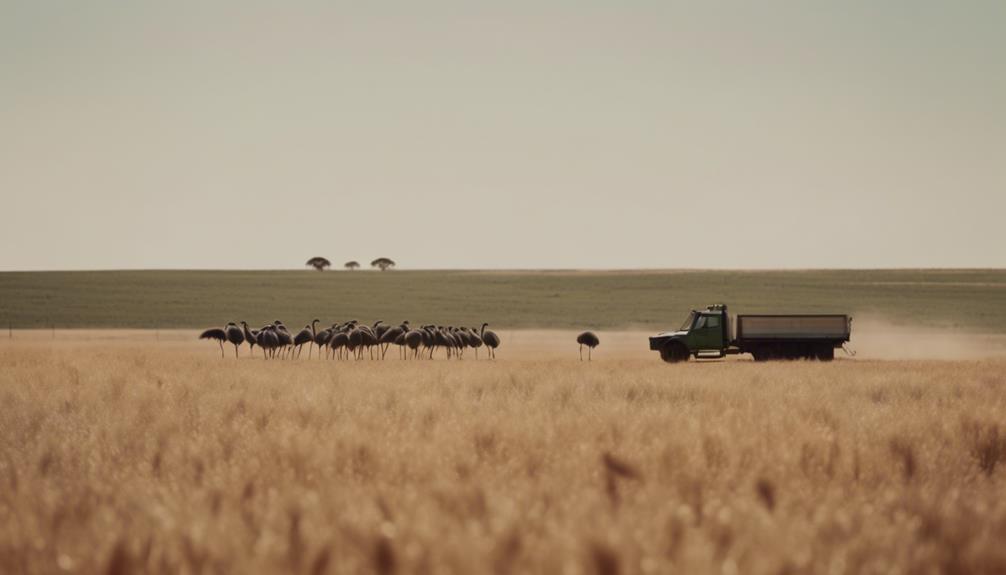
Emus play a crucial role in Australian agriculture by providing various economic benefits to farmers and the industry as a whole. The financial impact of emus is significant, with one of the primary contributions being their meat. Emu meat is lean, low in cholesterol, and high in protein, making it a sought-after product in the health-conscious market. This demand for emu meat not only generates revenue for farmers but also stimulates economic activity in related industries such as food processing and retail.
Moreover, emus contribute to the economy through their feathers, oil, and leather. Emu feathers are utilized in various products like fashion accessories and home decor items, adding value to the fashion and design sectors. Emu oil is known for its medicinal and cosmetic properties, creating a niche market with high-value products. Emu leather is also prized for its durability and is used in luxury goods manufacturing, further enhancing the economic value that emus bring to Australian agriculture.
Emus as Pest Controllers
How do emus contribute to controlling pests in Australian agriculture, and what impact does this role have on the ecosystem and crop protection? Emus play a crucial role as natural predators, aiding in the management of pests that can harm crops and vegetation. Here are four key points to consider:
- Natural Pest Control: Emus have a diverse diet that includes insects, small rodents, and even small reptiles. By consuming these pests, emus help to naturally regulate their populations, reducing the need for chemical pesticides.
- Integrated Pest Management: Farmers can incorporate emus into their integrated pest management strategies. By allowing emus to roam certain areas, farmers can benefit from their pest control services while minimizing environmental impacts.
- Ecosystem Balance: Emus contribute to maintaining a balance in the ecosystem by keeping pest populations in check. This balance is vital for the overall health and sustainability of agricultural lands.
- Crop Protection: Emus' role in pest control directly translates to better crop protection. With fewer pests damaging crops, farmers can expect higher yields and reduced economic losses.
Emus' Low Maintenance Requirements
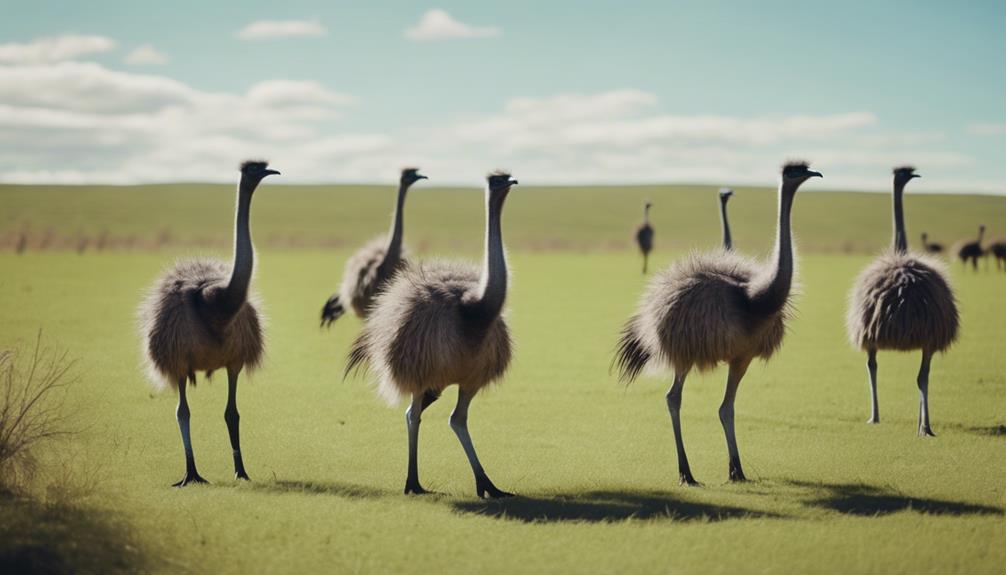
Requiring minimal upkeep, emus demonstrate a remarkable ability to thrive with little human intervention in agricultural settings. Their low maintenance requirements make them a cost-effective choice for farmers looking to streamline operations. Emus are naturally equipped to forage for food, primarily consuming fruits, seeds, and insects. This self-sufficiency significantly reduces the need for supplemental feeding, lowering overall costs for farmers. Emus are also resilient birds, able to withstand harsh weather conditions and adapt to various environments without extensive shelter or special care.
Their low maintenance nature extends beyond feeding habits. Emus are generally healthy animals that require minimal veterinary care compared to other livestock. This further contributes to their cost-effective benefits for farmers. Additionally, emus have a long lifespan, providing a stable and consistent investment over time without the need for frequent replacements. Their ability to thrive with minimal human intervention not only saves farmers time and money but also aligns with sustainable farming practices by reducing the environmental impact associated with intensive animal husbandry.
Emus and Sustainable Farming
With their ability to thrive independently and their minimal environmental impact, emus play a crucial role in promoting sustainable farming practices. When considering sustainable farming, emus offer unique benefits that contribute to the overall ecosystem health and productivity. Here are some key ways in which emus support sustainable farming:
- Emus and Crop Rotation: Emus naturally help with crop rotation by grazing on a variety of plants. Their selective feeding behavior prevents overgrazing of specific plant species, allowing for more diverse crops to be grown in rotation.
- Emus and Carbon Sequestration: Emus play a role in carbon sequestration through their foraging habits. By consuming vegetation and spreading seeds through their droppings, emus contribute to the growth of plants that absorb carbon dioxide from the atmosphere, aiding in carbon sequestration.
- Minimal Environmental Impact: Unlike traditional livestock, emus have minimal environmental impact due to their low water and feed requirements, making them a sustainable choice for farming practices.
- Promotion of Biodiversity: Emus help maintain biodiversity by supporting the growth of various plant species through their feeding habits, ultimately fostering a more resilient ecosystem.
Emus' Role in Biodiversity
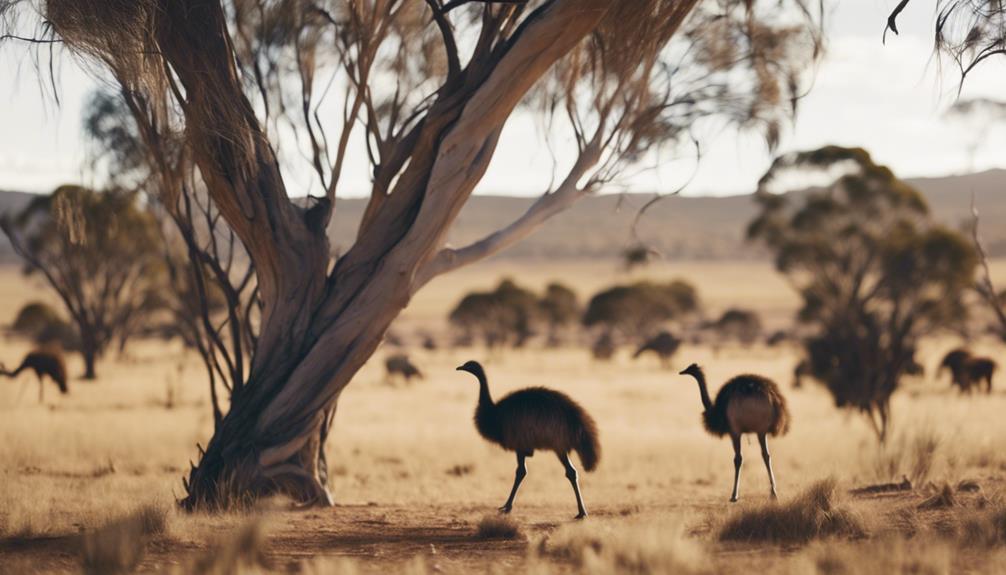
Emus significantly contribute to biodiversity conservation through their foraging habits and interactions with various plant species in the ecosystem. These large flightless birds play a crucial role in maintaining ecosystem balance by influencing vegetation structure and composition. Emus are known to consume a wide variety of plants, which helps prevent the dominance of certain species and promotes biodiversity by creating space for other plants to thrive. By selectively foraging on different plant species, emus indirectly support the growth of a diverse range of vegetation, which in turn provides habitats for various wildlife species.
In addition to their impact on plant diversity, emus also play a role in wildlife conservation. As emus move through their habitat in search of food, they disturb the soil and create small patches of bare ground. These disturbances can benefit other wildlife species by exposing seeds to favorable germination conditions and creating microhabitats for small animals. Therefore, emus contribute to the overall health and resilience of ecosystems, supporting a rich and diverse array of plant and animal species.
Emus and Soil Health
Contributing to the intricate web of ecosystem dynamics, the interactions of emus with the soil play a vital role in maintaining soil health and productivity. Here's how emus contribute to soil health:
- Enhanced Soil Fertility: Emus aid in soil aeration through their foraging behavior, which helps improve nutrient circulation and microbial activity, ultimately enhancing soil fertility. This increased fertility supports the growth of healthier crops.
- Natural Tilling: Emus, through their constant movement and scratching for food, act as natural tillers. This process helps break up compacted soil, allowing better water infiltration and root growth.
- Nutrient Cycling: Emus consume a variety of plants and redistribute nutrients through their droppings across different areas. This aids in nutrient cycling, benefiting soil health and supporting plant growth in a natural manner.
- Facilitating Crop Rotation: By naturally managing vegetation in an area, emus indirectly support crop rotation practices. Their presence can help control weed growth and maintain a balanced ecosystem, essential for successful crop rotation strategies.
Emus in Organic Farming
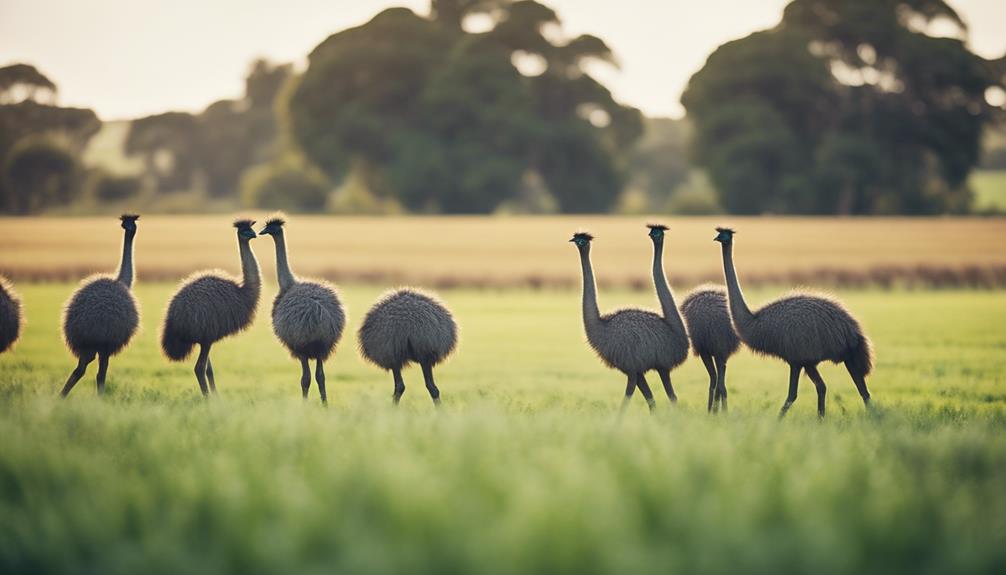
In organic farming practices, the presence of emus has been shown to significantly impact soil health and agricultural sustainability. Emus play a crucial role in permaculture systems by enhancing soil fertility through their foraging behavior. These large birds disturb the soil surface as they search for food, which helps break up compacted soil, improve aeration, and promote water infiltration. Furthermore, emus produce nutrient-rich manure that acts as a natural fertilizer, replenishing the soil with essential minerals and organic matter.
Studies have demonstrated that areas where emus roam freely exhibit higher levels of soil microbial activity and increased nutrient cycling compared to areas without emus. The interaction between emus and the soil ecosystem in organic farming environments creates a harmonious balance that benefits both the land and the emus themselves. By incorporating emus into organic farming practices, farmers can harness their natural behaviors to enhance soil health, promote sustainable agriculture, and foster a more resilient farming system.
Emus and Crop Protection
Enhancing agricultural productivity through the natural behaviors of emus involves exploring their potential role in crop protection strategies. When considering emu crop interactions and emu farming techniques, here are some key points to keep in mind:
- Foraging Habits: Emus have a diverse diet that includes insects, weeds, and even small rodents. Their foraging habits can help control pests and weeds in agricultural fields naturally.
- Fencing Strategies: Emus are tall birds that can be used to test the effectiveness of crop protection fencing. Observing how emus interact with different types of fencing can provide insights into improving crop security.
- Crop Monitoring: Emus can be trained to patrol crop fields, alerting farmers to potential threats like pests or intruders. Harnessing their natural curiosity can enhance surveillance efforts.
- Companion Planting: Integrating emus into agricultural systems can complement companion planting techniques. Emus can help maintain the balance between crops, pests, and beneficial organisms, contributing to sustainable crop protection strategies.
Emus as Livestock Guardians
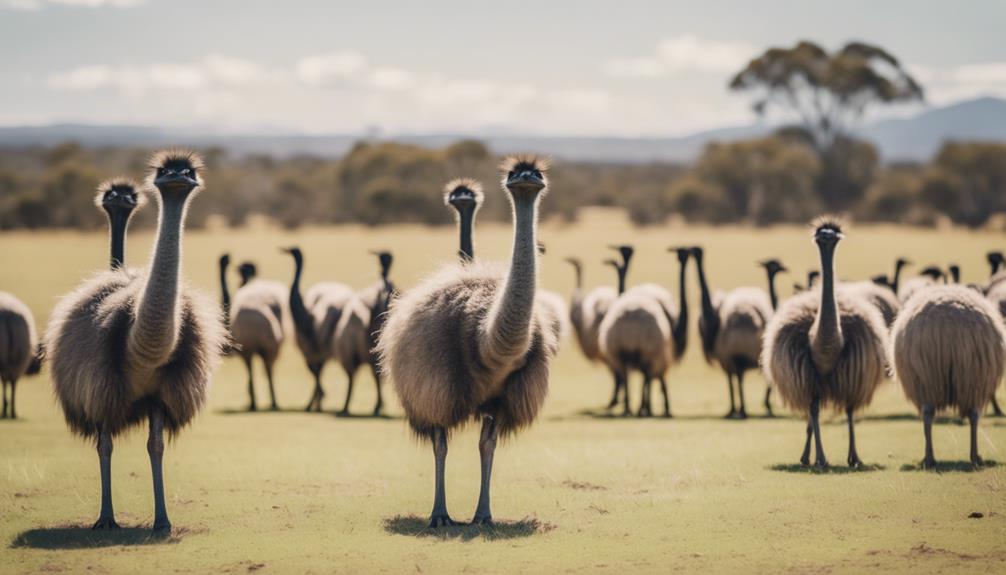
Emus demonstrate potential as effective guardians for livestock in agricultural settings due to their natural instincts and protective behaviors. Guardian emus have shown remarkable capabilities in predator control, helping to safeguard other animals on the farm. Research indicates that emus have a keen sense of danger and are quick to alert the herd in case of approaching threats, such as foxes or wild dogs. Their large size and speed also make them intimidating to potential predators, acting as a deterrent in itself.
Studies have shown that farms employing guardian emus have experienced reduced livestock losses due to predation. This not only benefits the farm economically but also reduces stress on the animals. By leveraging the innate protective instincts of emus, farmers can enhance the overall security of their livestock without resorting to harmful chemicals or excessive human intervention.
Emus in Regenerative Agriculture
Utilizing emus as components of regenerative agriculture practices can significantly enhance soil health and biodiversity on farms. Emus play a vital role in permaculture systems by naturally controlling pests and weeds, reducing the need for harmful chemical inputs.
Here are four ways emus contribute to regenerative agriculture:
- Natural Fertilization: Emus deposit nutrient-rich droppings as they forage, acting as a natural fertilizer that enhances soil fertility and promotes plant growth.
- Biodiversity Support: Emus help maintain biodiversity by dispersing seeds in their droppings, aiding in the growth of a variety of plant species and supporting ecosystem health.
- Weed Control: Emus have a selective diet and can help control weed populations by consuming certain plant species, reducing the competition for resources among crops.
- Carbon Sequestration: Emus play a role in carbon sequestration through their foraging habits, which can help improve soil structure and enhance its ability to store carbon, contributing to mitigating climate change effects.
Emus and Water Conservation
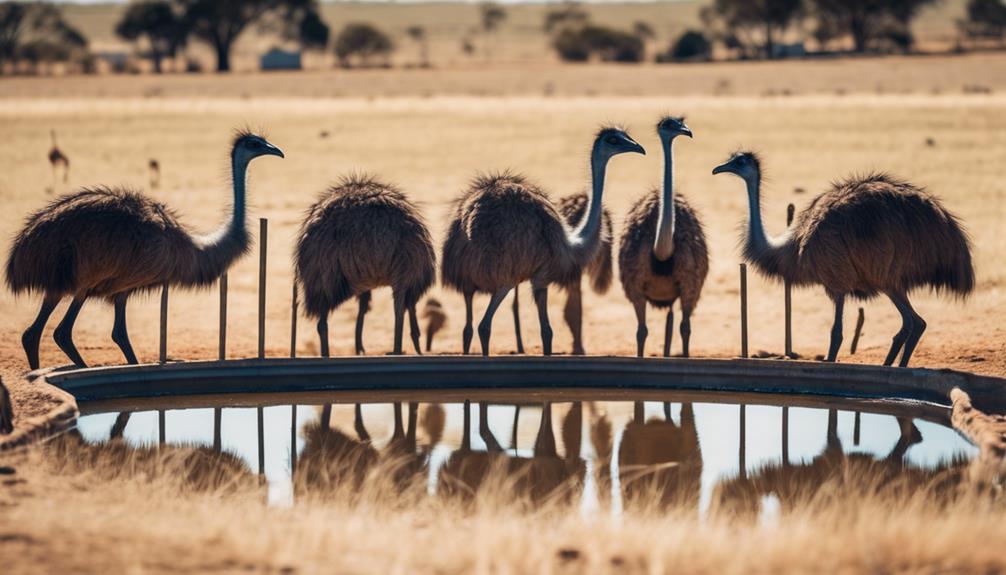
Emus' impact on soil health and biodiversity in regenerative agriculture systems extends to their role in water conservation practices within agricultural landscapes. Emus have evolved unique behaviors that contribute to water conservation, making them valuable assets in regions prone to water scarcity and drought. By understanding how emus interact with their environment, farmers can implement conservation techniques that enhance water retention and promote sustainable farming practices.
—
| Emus and Water Conservation | Importance |
|---|---|
| Ability to dig for water sources | Helps access underground water during dry periods |
| Role in seed dispersal | Encourages plant growth and assists in preventing soil erosion |
| Water usage efficiency | Emus require less water compared to other livestock, conserving resources |
| Impact on vegetation cover | Enhances ground cover, reducing water evaporation and soil erosion |
Emus play a crucial role in maintaining water resources, aiding in drought resilience and sustainable farming practices. Their presence in agricultural landscapes can significantly contribute to water conservation efforts, making them valuable partners in mitigating the impacts of water scarcity on farms.
Future of Emus in Agriculture
The potential integration of emus into modern agricultural systems holds promise for enhancing sustainability and resilience in farming practices. Emus aren't only valuable for their meat and oil but also for their potential contribution to technological advancements and climate adaptation in agriculture.
- Emus in Technology: Emus possess unique characteristics that can be harnessed through technology to improve farming practices. For example, their strong legs can inspire innovations in machinery design for more efficient farm work.
- Emus and Climate Adaptation: Emus have adapted to Australia's diverse climates, showcasing their resilience to harsh conditions. Studying emus can provide insights into how farming practices can adapt to climate change and extreme weather events.
- Genetic Research: Research into emu genetics can lead to breeding programs that enhance desirable traits for agricultural purposes, such as disease resistance and high-quality meat production.
- Educational Programs: Integrating emus into agricultural education programs can help farmers learn about sustainable practices and the benefits of incorporating emus into their operations.
Frequently Asked Questions
Do Emus Pose Any Health Risks to Humans or Other Animals on a Farm?
Emus, due to their behavior, can transmit zoonotic diseases like avian influenza. Proper biosecurity measures in emu farming are crucial to mitigate health risks to both humans and other animals on a farm.
Can Emus Be Trained to Perform Specific Tasks on a Farm?
To train emus for specific farm tasks, understanding emu behavior is crucial. Emus can be taught skills like herding, guarding, or even pest control. With patience and consistency, emus can become valuable assets on a farm.
How Do Emus Interact With Other Livestock Animals on a Farm?
Emus, with their curious nature and strong demeanor, tend to be cautious around other livestock. They may observe from a distance, establishing boundaries through subtle cues. Understanding emu behavior can foster harmonious livestock interactions on a farm.
Are There Any Specific Regulations or Guidelines for Raising Emus on a Farm?
When raising emus on your farm, it's essential to follow regulations and guidelines related to emu health risks, training emus, and overall welfare. Compliance ensures a successful and sustainable emu farming operation.
What Are the Most Common Challenges Faced by Emu Farmers in Australia?
When breeding emus, challenges like genetic diversity and reproductive issues can arise. Market demand fluctuations pose risks, affecting prices and sales. Emu farmers in Australia navigate these obstacles to sustain their operations and meet market needs.
Conclusion
In conclusion, the emu's role in Australian agriculture goes beyond just being an animal on a farm. Emus are like silent guardians, working tirelessly to maintain the balance of ecosystems and support sustainable farming practices.
Their economic benefits, pest control abilities, and low maintenance requirements make them invaluable assets to the agricultural industry.
As we look to the future, embracing the emu's presence on our farms can lead us towards a more harmonious and prosperous agricultural landscape.




